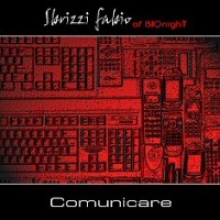MENNO VON BRUCKEN FOCK
COMUNICARE (NL+E)

Het Italiaanse duo BIOnight bestaat uit MAC en Fabio Sbrizzi. De laatste gebruikt geen loops of samples in zijn muziek, die - mogelijk daardoor - veel rustiger is dan veel werk van zijn kompaan MAC. Comunicare opent met een sequence die langzaam aanzwelt en waarbij achtergrondakkoorden op synths worden toegevoegd. De bastonen klinken in mijn speakers soms wel erg doordringend. Langzame melodielijnen, zoals Klaus Schulze in de tweede helft jaren zeventig gebruikte, completeren het nummer. In track 2 speelt de linkerhand elektronische orgelakkoordjes, terwijl de rechterhand eveneens met drie vingers speelt, maar dan de noten achter elkaar. Vervolgens hoor je een zweverige melodie vertolkt door een synthesizer. Het geheel komt op mij wat zeurderig over. Ook track 3 is erg in de stijl van Schulze uit jaren zeventig, terwijl het slot het midden houdt tussen Schulze en Tangerine Dream uit diezelfde periode. Gezien de opbouw en de herkenbare melodie is dit voor mij het beste stuk van het album, maar het heeft helaas wel een wat snel weggedraaid einde. De meest melodieuze track is de laatste. Simpele basnootjes ter ondersteuning en gedragen majestueuze klanken die ondersteund door tromgeroffel worden opgebouwd naar een zweverige, fluitende synthsolo om vervolgens weer te worden afgebouwd naar een wegstervend basloopje. Geen onaardige cd, maar zeker geen klassieker in wording.
ENGLISH:
The Italian duo BIOnight consists of MAC and Fabio Sbrizzi. The latter makes no use of loops and samples in his music, which probably explains why it is much quieter than the majority of the work that his colleague MAC produces. Comunicare opens with a sequence that slowly swells and to which synth backing chords are added; the bass tones here come rather overpoweringly out of my speakers. Slow melody lines that recall Klaus Schulze from the second half of the seventies, complete this track. In the next track the left hand plays electronic organ chords while the right hand plays three-finger arpeggios followed by a drifting melody performed on a synthesizer. On the whole this comes over to me as a bit dismal. Track 3 is also in the style of Klaus Schulze, but here the closing passage finds a midway between Schulze and Tangerine Dream from the same period and thanks to the construction and a recognizable melody this is for me the best piece on the album, although the end comes too suddenly. The last track is also the most melodic: simple bass tones supporting majestically formed sounds that build up gradually with the help of drum rolls until a high, whistling synth solo arrives, after which the piece slowly dissipates into a final fading bass-line. Not an unpleasant album, but no future classic either.